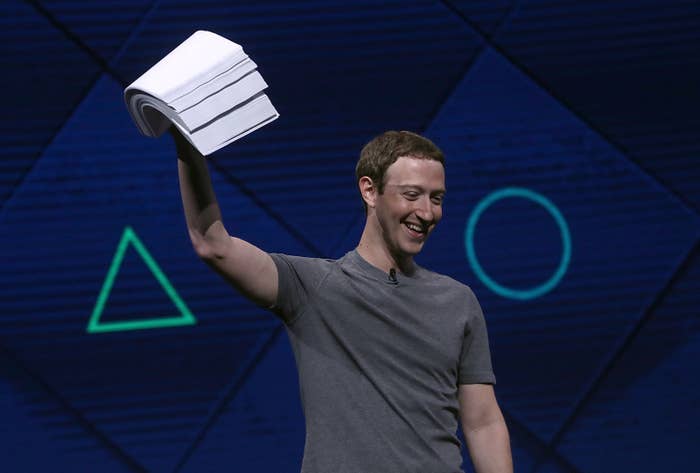
As Facebook has been tinkering with brain–computer interfaces and an augmented-reality camera platform, it's also been cultivating some good old-fashioned Washington influence. According to federal lobbying disclosures filed Thursday, the social network set its own all-time record high for spending in a single quarter.
Facebook spent $3.2 million lobbying the federal government in the first months of the Trump era. During the same period last year, Facebook spent $2.8 million (about 15% less). The company lobbied both chambers of Congress, the White House, and six federal agencies on issues including high-tech worker visas, network neutrality, internet privacy, encryption, and international taxation. Facebook was the 12th-highest spender out of any company and second-highest in tech.
"Our work in Washington demonstrates our commitment to protecting the people who use our service and promoting the value of innovation to the US economy," a Facebook spokesperson told BuzzFeed News. "As with the first quarter last year, our expenditure shows an increase that is mainly related to the timing of stock-based compensation for a number of employees.”
While Facebook's first-quarter figures for 2016 were the largest for that year, that was not the case in 2015. And outside firms that lobbied on behalf of Facebook spent more money in the first quarter of 2017 than in any other period in the past two years.
Apple spent $1.4 million, which is just $50,000 more than during the final months of the Obama presidency, when it set its previous record, but the most it has ever spent in a single quarter. Apple lobbied on issues including government requests for data, the regulation of mobile health apps, and self-driving cars.
Google, once again, outspent every other technology company. It was 10th overall, tallying $3.5 million.
"We think it is important to have a strong voice in the debate and help policymakers understand our business and the work we do to keep the internet open and fuel economic growth," a Google spokesperson told BuzzFeed News.
While the search giant decreased its lobbying spending compared with this time last year, Amazon, Microsoft, and Uber all boosted their beltway budgets for the first three months of 2017.
Amazon spent nearly $3 million on lobbying, behind only Facebook and Google, and was 17th out of all companies including ones outside of tech. Amazon met with government officials to discuss net neutrality, drone air cargo, drone privacy, and the flow of data across borders, among other issues. Microsoft claimed $2.3 million as the fourth-biggest spender in tech and 27th overall.
Uber continues to dwarf its ride-hail competitor Lyft in lobbying heft. Lyft spent $110,000 in the first quarter of this year, a massive increase over its amount last year, at $20,000. But Uber towered over its rival, spending $370,000, continuing an upward trend.
SpaceX has also amplified its spending compared with the first quarter of last year. Founded by Elon Musk, who was tapped by President Trump as an economic adviser, the company spent $480,000. SpaceX lobbied NASA, the Department of Defense, the National Security Council, and Congress on issues including commercial space launches, NASA funding, and defense space transportation.
The second-biggest spender out of any company was AT&T, which shelled out $4.6 million. The company's proposed $85 billion merger with Time Warner, now under review by the Justice Department, is being closely watched by industry analysts and political observers. The outcome of the deal may serve as a test for Trump, who vowed to squash the proposal if he were elected. But since winning the White House, Trump has softened his remarks.
Next week, during a confirmation hearing on Capitol Hill, Senators will scrutinize Trump's pick to lead the Justice Department's antitrust division, Makan Delrahim. As the country's top competition enforcer, Delrahim would play a key role in AT&T's merger review and in the bubbling debate over market concentration in tech, media, and the broader American economy. Before serving as deputy counsel in Trump's White House, Delrahim worked as a lawyer and lobbyist at the law firm Brownstein Hyatt Farber Schreck. Qualcomm and Comcast were among his lobbying clients.
